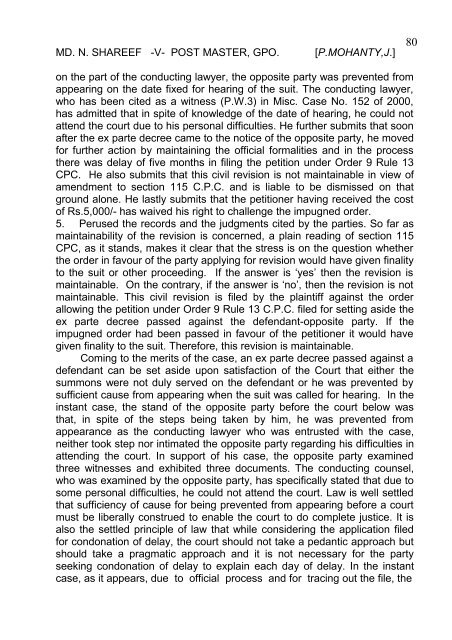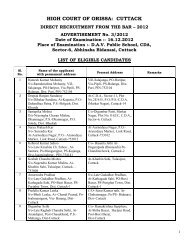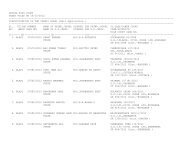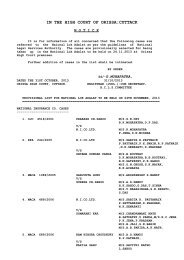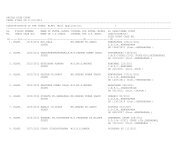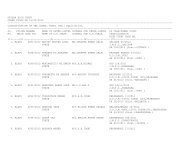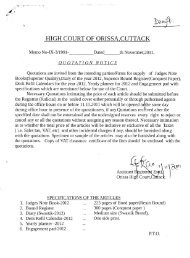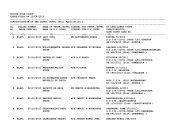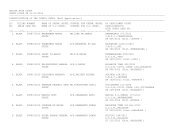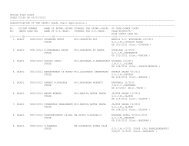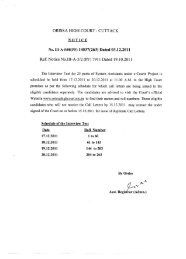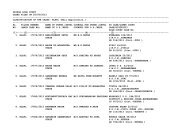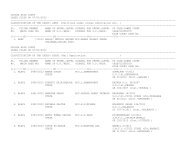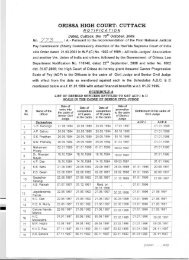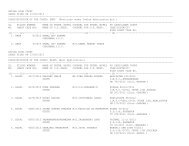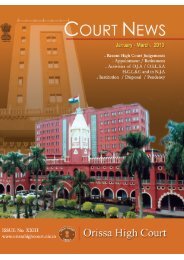ORIGINAL JURISDICTION - Orissa High Court
ORIGINAL JURISDICTION - Orissa High Court
ORIGINAL JURISDICTION - Orissa High Court
You also want an ePaper? Increase the reach of your titles
YUMPU automatically turns print PDFs into web optimized ePapers that Google loves.
MD. N. SHAREEF -V- POST MASTER, GPO. [P.MOHANTY,J.]<br />
on the part of the conducting lawyer, the opposite party was prevented from<br />
appearing on the date fixed for hearing of the suit. The conducting lawyer,<br />
who has been cited as a witness (P.W.3) in Misc. Case No. 152 of 2000,<br />
has admitted that in spite of knowledge of the date of hearing, he could not<br />
attend the court due to his personal difficulties. He further submits that soon<br />
after the ex parte decree came to the notice of the opposite party, he moved<br />
for further action by maintaining the official formalities and in the process<br />
there was delay of five months in filing the petition under Order 9 Rule 13<br />
CPC. He also submits that this civil revision is not maintainable in view of<br />
amendment to section 115 C.P.C. and is liable to be dismissed on that<br />
ground alone. He lastly submits that the petitioner having received the cost<br />
of Rs.5,000/- has waived his right to challenge the impugned order.<br />
5. Perused the records and the judgments cited by the parties. So far as<br />
maintainability of the revision is concerned, a plain reading of section 115<br />
CPC, as it stands, makes it clear that the stress is on the question whether<br />
the order in favour of the party applying for revision would have given finality<br />
to the suit or other proceeding. If the answer is ‘yes’ then the revision is<br />
maintainable. On the contrary, if the answer is ‘no’, then the revision is not<br />
maintainable. This civil revision is filed by the plaintiff against the order<br />
allowing the petition under Order 9 Rule 13 C.P.C. filed for setting aside the<br />
ex parte decree passed against the defendant-opposite party. If the<br />
impugned order had been passed in favour of the petitioner it would have<br />
given finality to the suit. Therefore, this revision is maintainable.<br />
Coming to the merits of the case, an ex parte decree passed against a<br />
defendant can be set aside upon satisfaction of the <strong>Court</strong> that either the<br />
summons were not duly served on the defendant or he was prevented by<br />
sufficient cause from appearing when the suit was called for hearing. In the<br />
instant case, the stand of the opposite party before the court below was<br />
that, in spite of the steps being taken by him, he was prevented from<br />
appearance as the conducting lawyer who was entrusted with the case,<br />
neither took step nor intimated the opposite party regarding his difficulties in<br />
attending the court. In support of his case, the opposite party examined<br />
three witnesses and exhibited three documents. The conducting counsel,<br />
who was examined by the opposite party, has specifically stated that due to<br />
some personal difficulties, he could not attend the court. Law is well settled<br />
that sufficiency of cause for being prevented from appearing before a court<br />
must be liberally construed to enable the court to do complete justice. It is<br />
also the settled principle of law that while considering the application filed<br />
for condonation of delay, the court should not take a pedantic approach but<br />
should take a pragmatic approach and it is not necessary for the party<br />
seeking condonation of delay to explain each day of delay. In the instant<br />
case, as it appears, due to official process and for tracing out the file, the<br />
80


